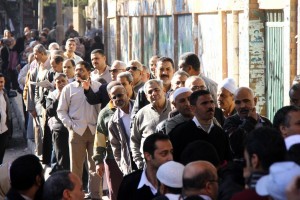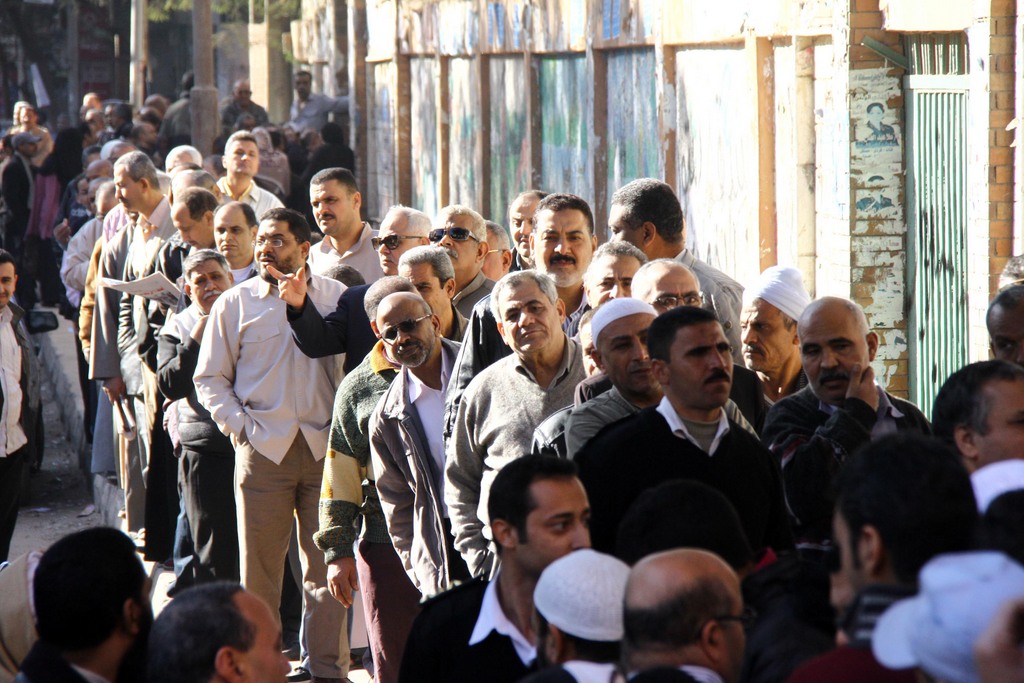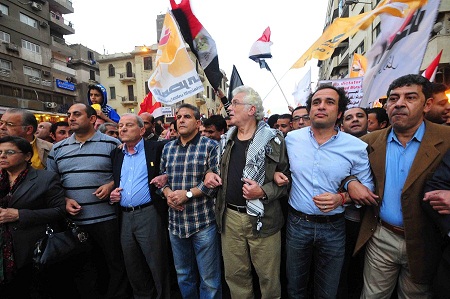
Unofficial results indicate that a majority of those who voted in the second round of the constitutional referendum last Saturday, voted in favour of the proposed constitution. Violence between supporters and detractors of the constitution, as well as voting fraud, has been reported across the country.
The second round of voting was held in 17 different governorates, with many being strong Islamist support bases. According to unofficial estimates, the referendum garnered a 71 per cent approval rating in the second round, resulting in a total 64 per cent vote of confidence for the country’s new constitution.
In the second phase, only one governorate voted “No” in the referendum. Menufiya rejected the constitution by a hairline margin; 51.3 per cent by unofficial estimates, while Port Said narrowly passed the referendum by 51.1 per cent. The smallest margin of approval following Port Said was Qaliubiya with 60.6 per cent.
The Egyptian Coalition for Electoral Observation (ECEO) recorded incidents of influencing voters in Menufiya, Port Said, New Valley, Beni Suef, Giza, Ismailia and Qaliubiya, which included Islamists standing outside polling stations urging people to vote “Yes.”
Voter fraud in polling stations within Menoufiya and Qalioubiya were also reported, where supervising judges were said to have voted “Yes” on behalf of the illiterate.
Governorates such as Matruh and Fayoum, the Islamist support bases, voted overwhelmingly in favour of the constitution, garnering 91.5 and 89.4 per cent approval respectively. Giza passed the referendum with 66.3 per cent, and Beheira by 75.4 per cent and New Valley by 87.3 per cent.
In Kafr Al-Sheikh, where the referendum was passed by 67 per cent, ECEO reported members of the Freedom and Justice Party (FJP) were present at polling stations exerting influence on people to vote in favour of the constitution.
The Minya governorate, a strong Coptic support base, voted 83 per cent in favour of the constitution. Qena, another governorate with a strong Coptic presence, also passed the referendum by 84.6 per cent. Copts were expected to vote overwhelmingly against the constitution. Reports of Copts being prevented from voting in Minya and Qena are rife. ECEO also documented voting fraud in Minya, while the Free Egyptians Party leader Ahmed Saeed said the prevention of Copts from voting is “a political and moral crime.”
ECEO recorded twelve different types of voting violations across Egypt in total, which included violence, intimidation, barring people with disabilities from entering polling stations, absence of judicial supervision, late opening of polling stations, voting influence, deceased yet registered voters, mass voter transportation and campaigning.
On Friday, violent clashes broke out between Islamists and non-Islamists in Alexandria resulting in 93 arrests, of which 74 were non-Islamists. A few protesters from both sides involved in the fighting were believed to have been carrying guns, while a Muslim Brotherhood spokesperson said some of the non-Islamists arrested, admitted to being paid by former regime figures to incite violence.
Minor scuffles resulting from the late opening of voting stations and voter persuasion were also reported at several polling stations in Giza, while supporters and opponents of the constitution clashed in Port Said and Qaliubiya on Saturday, ECEO reported.
In a press conference held by the Independent Coalition for Monitoring Elections (ICME) on Sunday, 15 violations were reported, which included religious politicising within mosques and polling stations, blank observation permits given to FJP members, voter influencing among poor and illiterate, delayed opening of polling stations, clashes and marked ballots.
ICME concluded, “the amount of violations has been enormous, that it directly affects the result of the referendum.”
Despite widespread reports of violations, the Muslim Brotherhood released an article on their official website saying the results reflect “the true measure of this enlightened nation’s civilized nature that no violent incidents were reported during voting, despite all the sharp political difference.” The group further stated that minor violations were reported, but were insignificant in scale.
The group went on to declare that a majority of Egyptians supported the constitution citing the 64 per cent of “Yes” votes.
According to the FJP spokesperson in Alexandria, Mohamed Soudan, the largest violation occurred in Nagaa Hammadi, where “there were a lot of [National Democratic Party] members blocking the road in front of the election committee building.”
Soudan blamed the media in Egypt of waging a war against the constitution, saying those that had boycotted the referendum were “media victims.”
“I am proud of the attitudes of the Egyptian people,” Soudan declared, adding the constitution is not static and can be changed from within the parliament as the country reforms itself.
Of the 25 million people registered to vote in the second round, only eight million went to the polls, resulting in a 32 per cent turnout of voters. The results, combined with the first round, are the lowest turnout since former president Hosni Mubarak was ousted from power. Nearly 17 million cast their votes in total, out of nearly 52 million registered voters.

